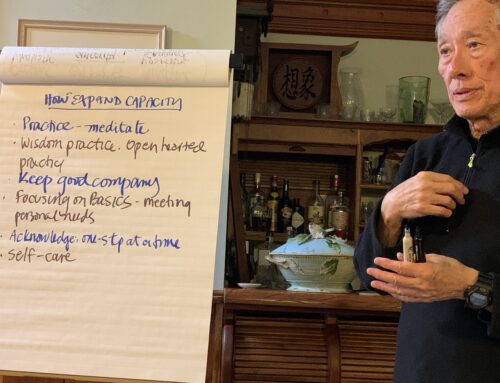
Image by geralt
“The letter killeth, but the spirit giveth life” (II Cor. 3:6).
You don’t have to look far before you find some well-meaning person warn other well-meaning people away from mindfulness because it’s against their religion.
Their concern is understandable. If they see the world from a religious perspective, they will see mindfulness as representing a religion as well. In this case, it’s usually Buddhism. While many people who have studied the Buddha’s teachings and understand what a religion is would readily tell you that Buddhism isn’t actually a religion, any serious mindfulness practitioner should also be able to tell you that’s irrelevant. Like I say, when your whole frame of reference is governed by religion, you see everything as being with or against your religion. What you see is entirely defined by how you see.
But mindfulness isn’t Buddhist.
Mindfulness is simply being aware. Certainly, the Buddha was a master at teaching people how to be aware, how to be mindful; but the practice of noticing with curiosity doesn’t exclusively belong to a belief system, religious or otherwise. What do you think they do inside monasteries all day? What about the Gnostics or the Sufis? People who are deeply into religious practice are—by default—deeply into their own particular version of mindfulness.
And it’s not just religious people who practice mindfulness. Top athletes around the world are exemplary practitioners of mindfulness. People at the top of their game in any field are, by definition, mindful people. They may not have the teachings of the Buddha to guide them, they may not incorporate mindfulness into every aspect of their lives, but in the moments they’re being mindful they are being exceptionally mindful.
Mindfulness can only enhance your religious practice. It can only help you go deeper, and take it further. Meditation is, after all, just an immersive form of prayer. If you are a believer in God, meditation will only take you closer to Him.
But the people who are concerned about the negative impact mindfulness could have on their religion may well have a point when it comes to dogma. If your experience of religion is purely academic, if it is the words—not the experience—that appeal to you, then there is the possibility that mindfulness could affect your faith. This is because mindfulness is about experience, not words. When you are truly in touch with yourself, you already know what is right and what is wrong. It’s not a moralistic thing, it’s just that what is right feels right, and what is wrong feels wrong.
Mindfulness aligns and attunes your senses in such a way that the idea of sin becomes one in which you realize you’re sinning against yourself. Think about it. Take the seven deadly sins, for instance: lust, envy, pride, gluttony, wrath, greed and sloth. When you’re noticing what is going on within you, you realize very fast that not one of these feels comfortable. When you’re being mindful, you don’t do these things because you notice they don’t work for you. It’s really that simple.
So yes, mindfulness could threaten the way you see religion, but it can only improve your experience of it. As always, it’s your call on which one you choose.




A great reminder Jamie, given that I have been worrying about having neglected you and Steve as kids…wholly innocent…I like it and I also know…really know… I was doing the best I knew . Thanks
It was discovered that meditation helps a method of pondering that enables new concepts to be
generated.